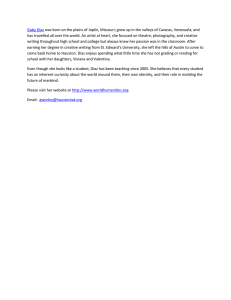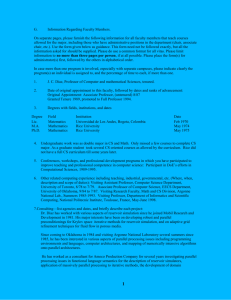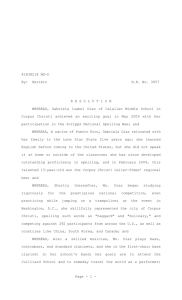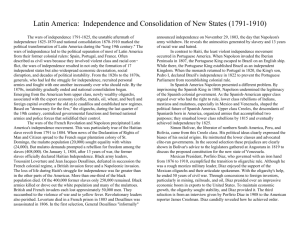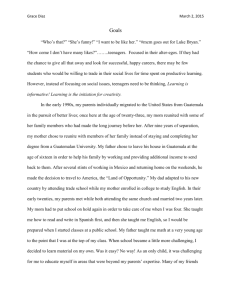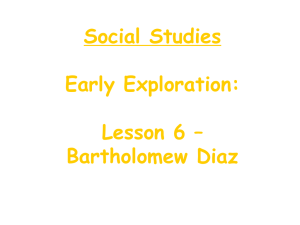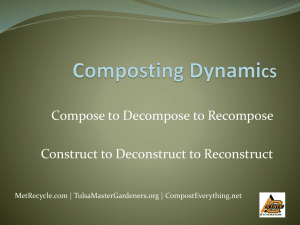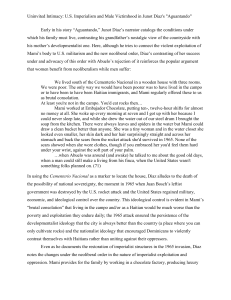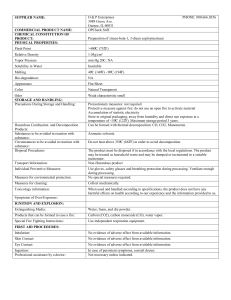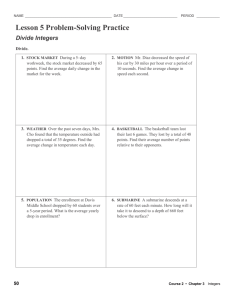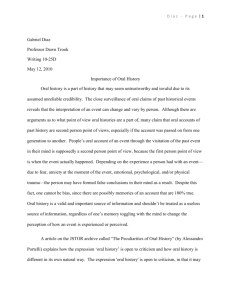JCDiaz-MSword - TU Department of Mathematical and
advertisement
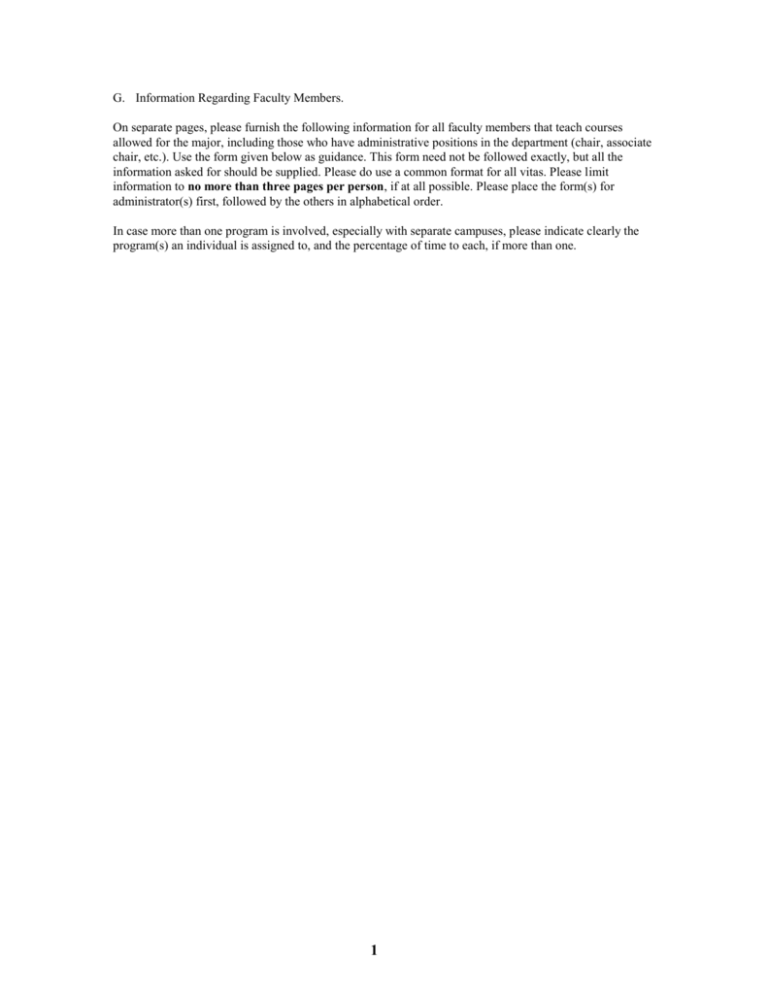
G. Information Regarding Faculty Members. On separate pages, please furnish the following information for all faculty members that teach courses allowed for the major, including those who have administrative positions in the department (chair, associate chair, etc.). Use the form given below as guidance. This form need not be followed exactly, but all the information asked for should be supplied. Please do use a common format for all vitas. Please limit information to no more than three pages per person, if at all possible. Please place the form(s) for administrator(s) first, followed by the others in alphabetical order. In case more than one program is involved, especially with separate campuses, please indicate clearly the program(s) an individual is assigned to, and the percentage of time to each, if more than one. 1 1. J. C. Diaz, Professor of Computer and mathematical Sciences, tenured. 2. Date of original appointment to this faculty, followed by dates and ranks of advancement: Original Appointment: Associate Professor, (untenured) 8/87 Granted Tenure 1989, promoted to Full Professor 1994. 3. Degrees with fields, institutions, and dates Degree Field Institution Date Lic. M.A. Ph.D. Matematics Mathematics Mathematics Universidad de Los Andes, Bogota, Colombia Rice University Rice University Feb 1970 May 1974 May 1975 4. Undergraduate work was as double major in CS and Math. Only missed a few courses to complete CS major. As a graduate student took several CS oriented courses as allowed by the curriculum. Rice did not have a full CS curriculum till some years later. 5. Conferences, workshops, and professional development programs in which you have participated to improve teaching and professional competence in computer science: Participant in DoE’s efforts in Computational Sciences, 1989-1995. 6. Other related computing experience including teaching, industrial, governmental, etc. (Where, when, description and scope of duties): Visiting Assistant Professor, Computer Science Department, University of Toronto, 8/78 to 7/79. Associate Professor of Computer Science, EECS Department, University of Oklahoma, 9/84 to 7/87. Visiting Research Faculty, Math and CS Division, Argonne National Lab., Summers 1985-1993. Visiting Professor, Department of Informatics and Scientific Computing, National Politecnic Institute, Toulouse, France, May-June 1998. 7. Consulting—list agencies and dates, and briefly describe each project: Dr. Diaz has worked with various aspects of reservoir simulation since he joined Mobil Research and Development in 1981. His major interests have been on developing robust and parallel preconditionings for Krylov space iterative methods for reservoir simulation, and on adaptive grid refinement techniques for fluid flow in porous media. Since coming to Oklahoma in 1984 and visiting Argonne National Laboratory several summers since 1985, he has been interested in various aspects of parallel processing issues including programming environments and languages, computer architectures, and mapping of numerically intensive algorithms onto parallel architectures. He has worked as a consultant for Amoco Production Company for several years investigating parallel processing issues in functional language semantics for the description of reservoir simulators, application of massively parallel processing to iterative methods, the development of domain decomposition techniques for faulted basin evolution, and currently developing mathematical models for primary hydrocarbon migration. 8. Department, college, and/or university committees of which you are a member: (Current only) Faculty Senate, Steering Committee of the Faculty Senate, Faculty Affairs Committee of the Faculty Senate (Chair). 9. Principal publications of the last five years. Give in standard bibliographic format. 2 J. C. Diaz, K. Shenoi, ``Domain Decomposition Approaches to Coupling the Well Equations in Reservoir Simulation,'' Siam J. Sci Comp, 1995, pp. 29-39. J. C. Diaz, F. Pradeau, ``Effects on Communication of Data Representation of Nested Preconditionings for Massively Parallel Architectures,'' Computing Systems in Engineering. 6, 1995, 437-441. M. A. Lopez-Marcos, J. M. Sanz-Serna, J. C. Diaz, ``Are Gauss-Legendre Methods useful in molecular dynamics,'' J. Compu. Appl. Math. 67 (1996), 111-127. J. C. Diaz , M. Komara and J.~Hensley , Incomplete domain decomposition $ LU$ factorizations. In P.~Bjorstad, M.~Espedal, and D.~Keyes, editors, Proceedings of The Ninth International Conference on Domain Decomposition in Sciences and Engineering, pp 80-87, Domain Decomposition Press, Bergen, Norway, 1998. J. C. Diaz , M. Komara ,The symmetric Cholesky multilevel $LU$ factorizations. SIAM J. Matrix Anal, to appear. J. C. Diaz , M. Komara The incomplete multilevel $LU$ factorizations. Numerical Linear Algebra and its Application. to appear 10. Other scholarly activity: grants, sabbaticals, software development, etc.: TU project Director for Oklahoma Alliance for Minority Participation in Science Mat. Enginneering and Technology (OKAM-SMET), NSF. TU-Summer Bridge Program Coordinator for OKAMP-SMET, OSRHE. Program Director, Zarrow Scholar Programs for Minority Participation in SMET programs. 11. Scientific, professional, and honor societies of which you are a member: Society for Industrial and Applied Mathematics (SIAM), Society of Petroleum Engineers ( SPE of the AIEM), Society of Exploration Geophysicists ( SEG ). Association for Computer Machinery (ACM). IEEE-Computer Society. 12. Honors and awards: 13. Courses taught this and last academic year term-by-term. (This year is the year in which this report was prepared; last year was the year prior to this.) If you were on sabbatical leave, please enter the information for the previous year. Please list each section of the same course separately. year/term course number course title credits Fall ‘99 Fall ‘99 Spr ‘00 Spr. ‘00 CS2503 ES2034 CS/ES2503 CS/SI1064 Scientific Programming Engineering Programming (Petroleum E.) Scientific/Engineering Programming Computational Scientific Inquiry 3 4 3 4 3 No. of students 21 25 46 4 14 Other assigned duties performed during the academic year, with average hours per week. Indicate which, if any, carry extra compensation. If you are course coordinator for courses taught by other than full-time faculty, please indicate here which courses. 15 Number of students for which you serve as academic advisor: 10-15 undergraduate and 3-4 graduate. 16. Estimate the percentage of your time devoted to scholarly and/or research activities: 25% Please give a brief description of your major research and scholarly activities: Metacomputing for Large Scale Scientific Applications. Computational Linear Algebra. 17. If you are not a full-time faculty member, state what percentage of full-time you work:_____% Percentage of this time allocated to the computer science program being evaluated:______% 4
